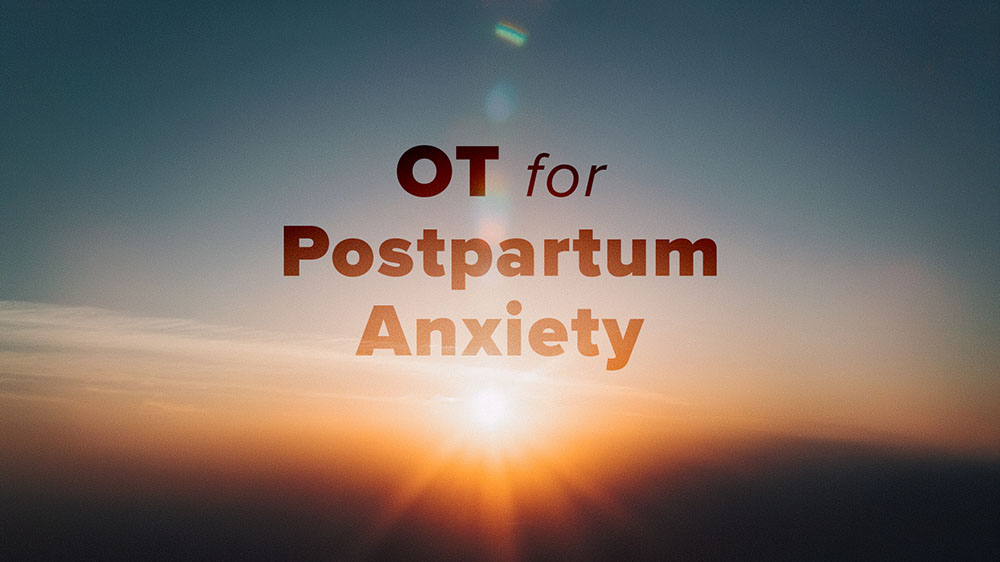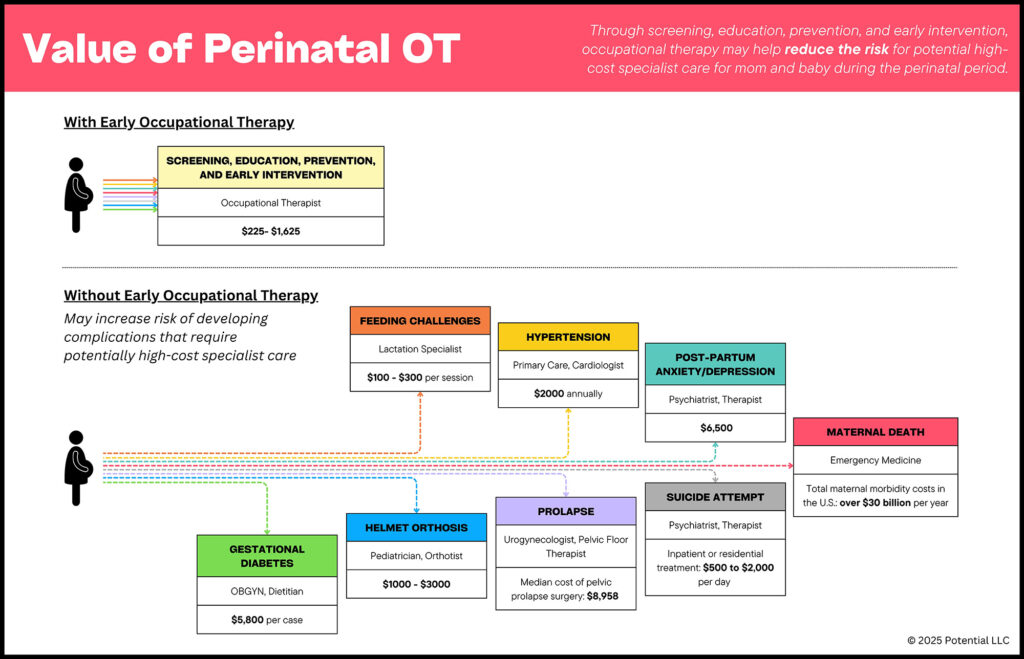If you’re seeking treatment (especially occupational therapy treatment) for postpartum anxiety, we want you to be as informed as possible so we can truly partner to create the best course of treatment for YOU.
In occupational therapy, we tend to work from a wide variety of evidence-based assessments and treatments. This gives us the flexibility to meet the specific needs of each patient. Below, you’ll see the assessment and treatment options your therapist may use, along with the evidence that supports them.

Please note that this page is for educational purposes and should not substitute advice from your medical provider.
At the bottom of this page, you’ll find therapists near you who specialize in maternal health.
A quick note on why to pursue therapy for postpartum anxiety
Postpartum anxiety is a common diagnosis affecting between 11% and 21% of new mothers.
Treatment for postpartum anxiety can include cognitive behavioral therapy, lifestyle changes, mindfulness-based interventions, and medication. OT professionals are uniquely equipped to provide a variety of complementary interventions that support individuals with postpartum anxiety, including strategies to improve sleep, promote relaxation, and enhance self-regulation.
A major benefit of occupational therapy for this population is that, when provided early in the care journey, OT can address multiple areas of both maternal and infant health. Occupational therapists can provide pelvic floor therapy, offer support with tummy time and developmental milestones, screen for cardiac health, etc. Here’s a visualization of the benefits of early OT:

Here are the sources for these cost estimates:
- Gestational diabetes estimated medical costs
- Lactation consultant estimated rates
- Helmet orthosis price
- Hypertension annual estimated medical costs
- Prolapse surgical intervention estimated cost
- Anxiety treatment (therapy and medication) estimated costs
- Inpatient psychiatric care estimated costs
- Maternal death societal cost
Therapist-recommended assessments for postpartum anxiety
As suggested by the assessments below, occupational therapy professionals take a holistic approach to treating postpartum anxiety.
In addition to informing treatment at the beginning of your therapy journey, assessments provide a point of comparison to track your progress and response to treatment over time. (Without an accurate and thorough baseline, it can be hard to tell how much the interventions are helping!) As such, your therapist may perform certain assessments at various intervals over the course of therapy.
Assessments for Postpartum Anxiety
- Edinburgh Postnatal Depression Scale (EPDS)
- Patient Health Questionnaire (PHQ-9)
- General Anxiety Disorder Assessment – 7 item (GAD-7)
- Canadian Occupational Performance Measure (COPM)
Setting goals for postpartum anxiety
Therapy only works when there is buy-in from the patient. It is important that you work with your therapist to set treatment goals that truly reflect what’s important to you.
Therapy treatment interventions for postpartum anxiety
After a thorough evaluation and goal-setting process, it is time to start making progress. Below are treatment interventions that can be implemented as part of a holistic therapy program.
- Education to help you better understand anxiety and how these treatment approaches can be helpful
- Cognitive behavioral approaches to reframe anxious thoughts 1,11,14,16
- Mindfulness-based practices that can be used during moments of anxiety 14-16
- Grounding
- Breathing
- Relaxation exercises
- Sensory-based strategies to help you regulate your nervous system and create a toolkit of resources you can use in your daily life whenever you might need them 10,12,13
- Exercise and movement 2,6,11
- Engagement in meaningful activities 2,6,11
- Sleep routines and quality 8
- Social support and social connectedness 1,3,5,11,13,17
- Support in emotional regulation techniques 1,4,5
- Role-playing
- Deep breathing
- Journaling
- Visual imagery
- Self-soothing techniques
- Expressive writing
Discharge suggestions
At discharge, our goal is to set you up for ongoing success—and to make sure you can identify clear indicators of when it may be appropriate to reach out for help again. Your occupational therapist may provide:
- Resources within the community that will help further support you
- A plan for you to follow if your symptoms return or get worse
- Strategies to help you stay consistent with the lifestyle habits and coping strategies that will best help set you up for success
Choosing a therapist for postpartum anxiety
When searching for an occupational therapy professional to provide treatment for postpartum anxiety, you may want to look for someone with multiple focus areas relevant to your condition (e.g., “anxiety,” “maternal health,” “insomnia,” or “pelvic floor therapy”).
One particularly relevant certification to look for is “PMH-C,” which stands for Perinatal Mental Health Certified.
Below, you can find OT professionals who have tagged maternal health as a focus area.
Conclusion
Hopefully, this article has helped you understand what therapy for postpartum anxiety entails, and whether you are a good candidate!
This article is updated regularly based on new research. If you have any research you would like us to consider for our next update, please drop it in the comments!
Therapists who would like more fleshed-out information on postpartum treatment can join us as members of the OT Potential Club.
References
Here’s the science backing the assessments and treatment outlined above.
- Acharya V. Preparing for motherhood: a role for occupational therapy. World Federation of Occupational Therapists Bulletin. 2014.
- Barkin JL, Wisner KL. The role of maternal self-care in new motherhood. Midwifery. 2013.
- Chung JPY. Interpersonal Psychotherapy for Postnatal Anxiety Disorder. East Asian Arch Psychiatry . 2015.
- Di Blasio P, Camisasca E, Caravita SCS, Ionio C, Milani L, Valtolina GG. The Effects of Expressive Writing on Postpartum Depression and Posttraumatic Stress Symptoms. Psychol Rep. 2015.
- Gonzalez-Garcia V, Exertier M, Denis A. Anxiety, post-traumatic stress symptoms, and emotion regulation: A longitudinal study of pregnant women having given birth during the COVID-19 pandemic. European Journal of Trauma & Dissociation. 2021.
- John HB, Philip RM, Santhanam S, et al. Activity based group therapy reduces maternal anxiety in the Neonatal Intensive Care Unit – a prospective cohort study. Early Human Development. 2018.
- Kaczkurkin AN, and Foa EB. Cognitive-behavioral therapy for anxiety disorders: an update on the empirical evidence. Dialogues in Clinical Neuroscience. 2015.
- Lawson A, Murphy KE, Sloan E, Uleryk E, Dalfen A. The relationship between sleep and postpartum mental disorders: A systematic review. Journal of Affective Disorders. 2015.
- McCarthy M, Houghton C, Matvienko-Sikar K. Women’s experiences and perceptions of anxiety and stress during the perinatal period: a systematic review and qualitative evidence synthesis. BMC Pregnancy and Childbirth. 2021.
- Mirghafourvand M, Charandabi SMA, Hakimi S, Khodaie L, Galeshi M. Effect of orange peel essential oil on postpartum sleep quality: A randomized controlled clinical trial. European Journal of Integrative Medicine. 2016.
- Misri S, Kendrick K. Treatment of Perinatal Mood and Anxiety Disorders: A Review. Can J Psychiatry. 2007.
- Norouzi F, Keshavarz M, SeyedFatemi N, Montazeri A. The impact of kangaroo care and music on maternal state anxiety. Complementary Therapies in Medicine. 2013.
- Nurlaila, Herini ES, Hartini S, Kusuma MTPL. Interventions to reduce parental stress and increase readiness of parents with preterm infants in the neonatal intensive care unit: A scoping review. Journal of Neonatal Nursing. 2023.
- Rowe HJ, Calcagni ,Soledad Coo, Galgut ,Sofia, Michelmore ,Janet, and Fisher JRW. Self-management of mild to moderate anxiety in women who have recently given birth: development and acceptability of a theoretically sound complex intervention. International Journal of Mental Health Promotion. 2014.
- Sajadian SZ, Javadifar N, Aslani K, Saki A. Effectiveness of mindfulness-based intervention in the improvement of maternal role adaptation among first time mothers: A randomized controlled trial. Complementary Therapies in Clinical Practice. 2022.
- Schwartz H, McCusker J, Da Costa D, et al. A pilot randomized controlled trial of a lay telephone coaching and web-based intervention for postpartum depression and anxiety: The MPOWER study. Internet Interventions. 2023.
- Sufredini F, Catling C, Zugai J, Chang S. The effects of social support on depression and anxiety in the perinatal period: A mixed-methods systematic review. Journal of Affective Disorders. 2022.
Additional Resources
- Screening programs for common maternal mental health disorders among perinatal women: report of the systematic review of evidence
- When is the best time to screen for perinatal anxiety? A longitudinal cohort study
OT Potential does not endorse any treatments, procedures, products, or therapists referenced herein. This information is provided as an educational service and is not intended to serve as medical advice. Anyone seeking medical advice should consult their medical provider.
